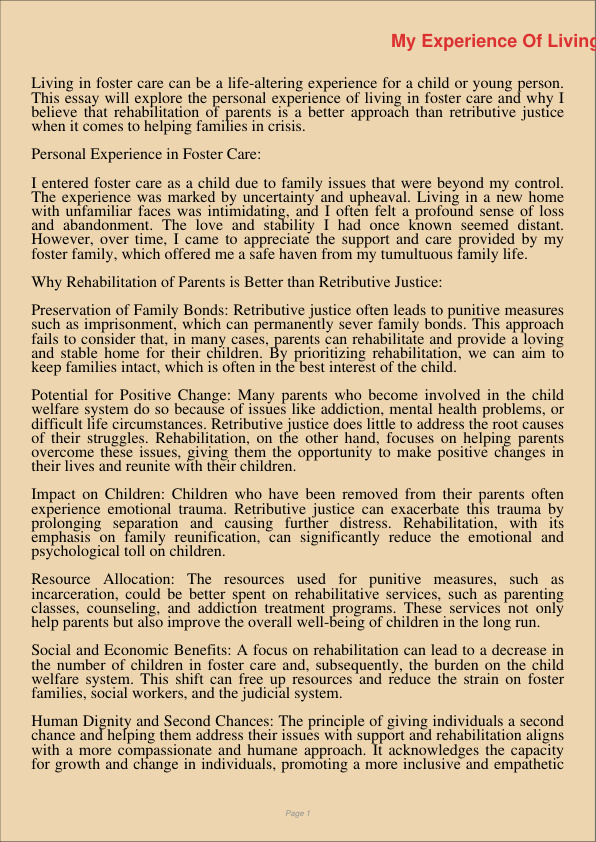My Experience Of Living In Foster Care And Why I Think Rehabilitation Of Parents Is Better Than Retributive Justice
Jan 6, 2024
think rehabilitation
retributive justice
Education
Visual Arts & Film Studies

Living in foster care can be a life-altering experience for a child or young person. This essay will explore the personal experience of living in foster care and why I believe that rehabilitation of parents is a better approach than retributive justice when it comes to helping families in crisis.
Personal Experience in Foster Care:
I entered foster care as a child due to family issues that were beyond my control. The experience was marked by uncertainty and upheaval. Living in a new home with unfamiliar faces was intimidating, and I often felt a profound sense of loss and abandonment. The love and stability I had once known seemed distant. However, over time, I came to appreciate the support and care provided by my foster family, which offered me a safe haven from my tumultuous family life.
Why Rehabilitation of Parents is Better than Retributive Justice:
Preservation of Family Bonds: Retributive justice often leads to punitive measures such as imprisonment, which can permanently sever family bonds. This approach fails to consider that, in many cases, parents can rehabilitate and provide a loving and stable home for their children. By prioritizing rehabilitation, we can aim to keep families intact, which is often in the best interest of the child.
Potential for Positive Change: Many parents who become involved in the child welfare system do so because of issues like addiction, mental health problems, or difficult life circumstances. Retributive justice does little to address the root causes of their struggles. Rehabilitation, on the other hand, focuses on helping parents overcome these issues, giving them the opportunity to make positive changes in their lives and reunite with their children.
Impact on Children: Children who have been removed from their parents often experience emotional trauma. Retributive justice can exacerbate this trauma by prolonging separation and causing further distress. Rehabilitation, with its emphasis on family reunification, can significantly reduce the emotional and psychological toll on children.
Resource Allocation: The resources used for punitive measures, such as incarceration, could be better spent on rehabilitative services, such as parenting classes, counseling, and addiction treatment programs. These services not only help parents but also improve the overall well-being of children in the long run.
Social and Economic Benefits: A focus on rehabilitation can lead to a decrease in the number of children in foster care and, subsequently, the burden on the child welfare system. This shift can free up resources and reduce the strain on foster families, social workers, and the judicial system.
Human Dignity and Second Chances: The principle of giving individuals a second chance and helping them address their issues with support and rehabilitation aligns with a more compassionate and humane approach. It acknowledges the capacity for growth and change in individuals, promoting a more inclusive and empathetic society.
In conclusion, my personal experience of living in foster care has led me to believe that rehabilitation of parents is a more effective and compassionate approach than retributive justice when addressing family issues. By offering parents the support and resources needed to address their challenges, we can work toward family reunification and provide children with a nurturing and stable environment. This approach not only benefits the families involved but also has positive social and economic implications, ultimately creating a more just and compassionate society.